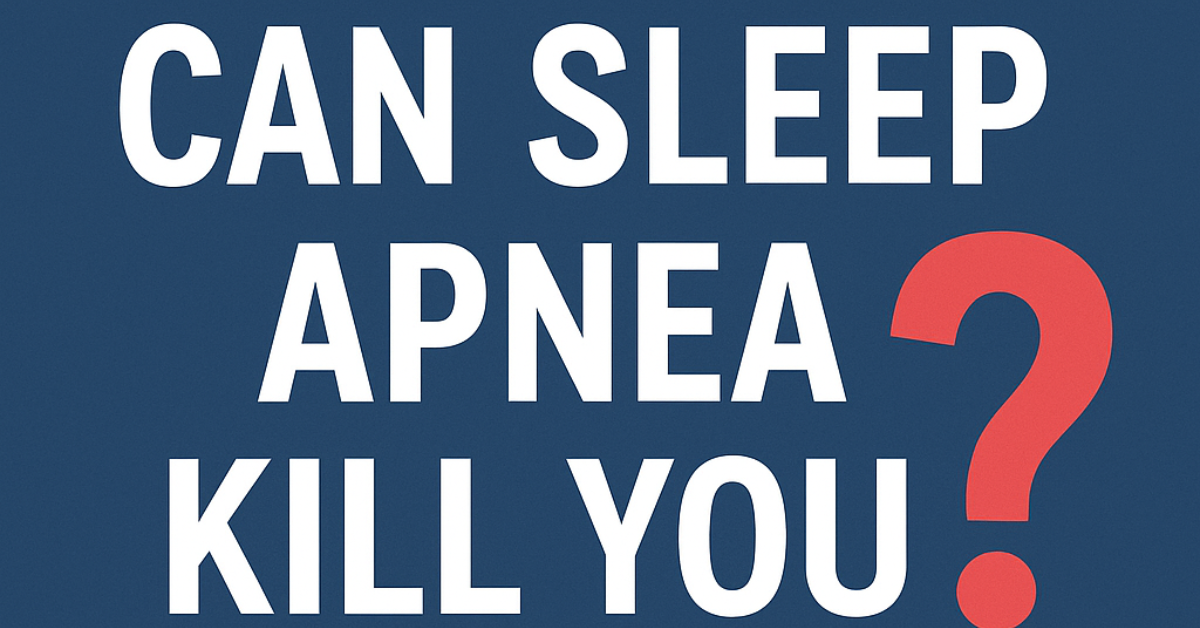Sleep apnea is far more than loud snoring or feeling tired—it’s a serious medical condition that can become life-threatening if left untreated. Many people ask, “Can sleep apnea kill you?” The short answer is yes, in severe cases, it can contribute to fatal complications. But the good news? It’s treatable, and early intervention dramatically reduces the risks.
What Is Sleep Apnea?
Sleep apnea is a sleep disorder where breathing repeatedly stops and starts during sleep.
The two main types are:
- Obstructive Sleep Apnea (OSA): Caused by blocked airways (most common)
- Central Sleep Apnea: The brain fails to send proper breathing signals
- Mixed/Complex Sleep Apnea: Combination of both
Can Sleep Apnea Kill You?
✅ Yes — indirectly, sleep apnea can lead to death-related health complications such as:
| Health Risk | How It Can Be Fatal |
|---|---|
| Heart Attack | Reduced oxygen raises strain on the heart |
| Stroke | Interrupts blood flow to the brain |
| Sudden Cardiac Death | Heart rhythm disturbances during sleep |
| High Blood Pressure | Long-term damage to arteries & heart |
| Irregular Heartbeat (Arrhythmia) | Can trigger fatal cardiac events |
| Car Accidents (due to exhaustion) | Severe sleepiness increases fatal crash risk |
⚠ Important: Sleep apnea itself doesn’t usually directly cause death, but it creates dangerous conditions that significantly raise the risk of dying.
Key Warning Signs of Sleep Apnea
If you or a loved one experiences any of these, consult a doctor:
- Loud, chronic snoring
- Sudden gasping or choking during sleep
- Waking up short of breath
- Morning headaches
- Extremely dry mouth after waking
- Daytime fatigue or falling asleep randomly
- Trouble focusing or memory issues
Who Is Most at Risk?
Higher risk applies to those who:
- Are overweight or obese
- Are over 40 years old
- Smoke or drink alcohol frequently
- Have a family history of sleep apnea
- Have a large neck circumference
- Have asthma, diabetes, or heart disease
How Sleep Apnea Is Treated
Effective treatments include:
| Treatment | Benefit |
|---|---|
| CPAP machine | Keeps airway open and prevents breathing pauses |
| Oral appliances | Helps position jaw to improve airflow |
| Lifestyle changes | Weight loss, exercise, quitting smoking |
| Surgery (in some cases) | Removes airway blockage |
💡 Using a CPAP device regularly reduces heart risks and can be life-saving.
Important Points to Remember (Key Highlights)
✔ Sleep apnea can contribute to fatal health complications
✔ It dramatically increases the risk of heart attack, stroke, and sudden death
✔ Loud snoring is not normal – it could be a warning sign
✔ Treatment like CPAP can significantly reduce death risk
✔ Early diagnosis saves lives
Frequently Asked Questions (FAQ)
1. Can you die in your sleep from sleep apnea?
Yes, in rare but severe cases, it can lead to sudden cardiac death, especially if untreated and combined with heart disease.
2. How many years can sleep apnea take off your life?
Studies suggest untreated sleep apnea can shorten life expectancy by up to 10–15 years depending on severity and other health conditions.
3. Is sleep apnea a silent killer?
Yes. Many people are unaware they have it until serious complications occur, making it a dangerous silent health threat.
4. Can skinny people have sleep apnea?
Yes. Although obesity is a risk factor, sleep apnea can affect anyone due to genetics, jaw structure, alcohol use, or nasal issues.
5. Does CPAP prevent death from sleep apnea?
It significantly lowers the risk by stabilizing oxygen levels, reducing heart strain, and preventing sleep disturbances.
Final Thoughts
Sleep apnea should never be ignored. While it may not kill you instantly, the long-term strain on your heart, brain, and overall health can be deadly. The good news is that diagnosis and treatment are highly effective and life-saving.
If you or someone you know shows symptoms, speak to a doctor or sleep specialist—your life could depend on it.
Latest Post
- Posterior Hip Dislocation: Causes, Symptoms & Treatment
- Dog Dislocated Hip: Symptoms, Treatment & Care
- Dislocated Hip Symptoms: Early Signs, Pain Patterns, and When to Seek Medical Help
- ICD 10 Code for Benign Prostatic Hypertrophy: Complete Coding & Clinical Guide
- Strep Pharyngitis ICD 10: Complete Guide for Diagnosis and Medical Coding
